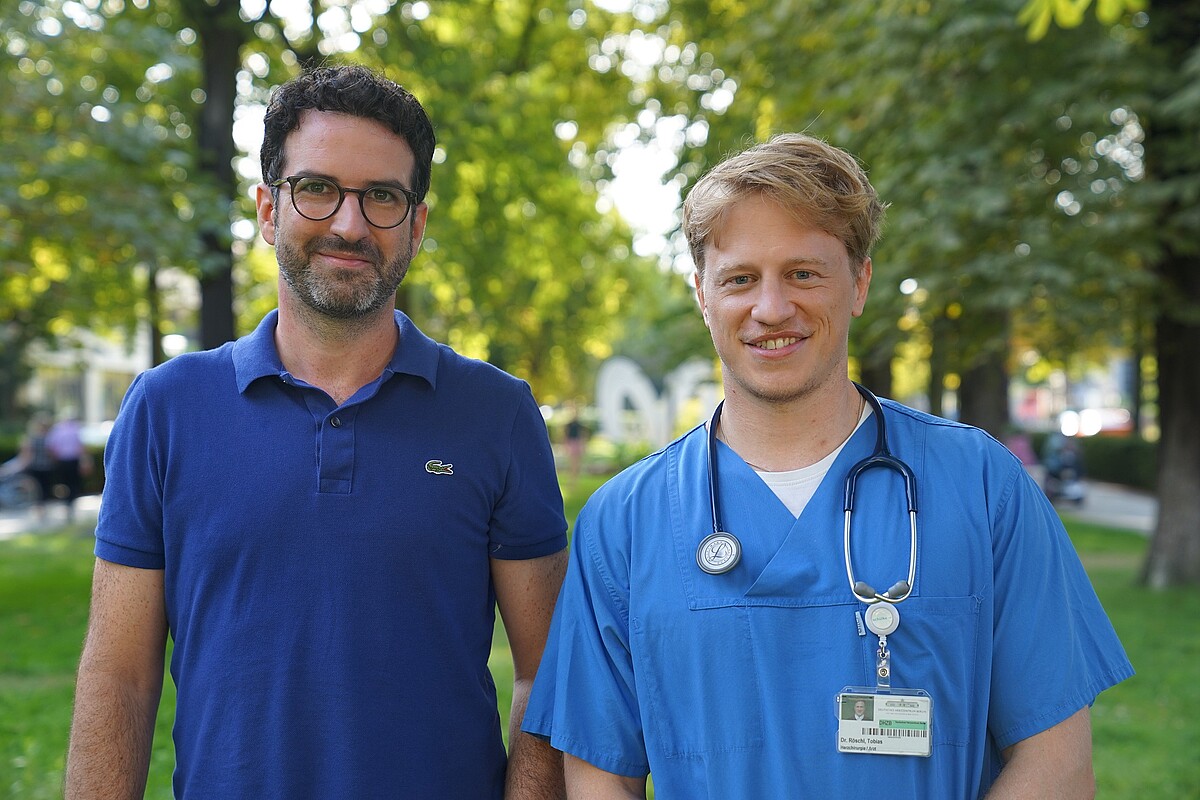Using data from around 27.000 patients, DHZC physician Tobias Röschl, MD, was able to prove the reliability of a risk classification of cardiogenic shock in intensive care patients undergoing cardiac surgery. The evidence, which has now been published in the Journal of the American College of Cardiology, can help doctors worldwide to assess a life-threatening clinical picture and to choose the best possible therapy in good time.
When the heart is acutely no longer able to supply the body's organs with sufficient blood, cardiogenic shock is present - one of the deadliest diseases of all, with a mortality rate of around 50 percent. Cardiogenic shock can occur, for example, in the course of a heart attack or in rare cases after heart surgery.
The SCAI shock classification was developed in 2019 by an expert committee of the Society for Cardiovascular Angiography and Interventions (SCAI) to uniformly determine the severity of cardiogenic shock: It classifies patients into five categories "A" to "E" based on vital signs (such as heart rate and blood pressure) and laboratory values (such as the arterial lactate value), whereby "A" ("at risk") stands for the lowest and "E" ("extreme") for the highest risk of dying from cardiogenic shock.
Risk classifications such as the SCAI shock classification are not only used for the exact description and uniform assessment of a patient's condition, but also for the selection of the ideal treatment strategy and as inclusion and exclusion criteria for scientific studies.
They should therefore differentiate as reliably as possible between low-risk and high-risk patients and be applicable to as many different patients as possible from different disciplines and regions of origin. For this reason, risk classifications are tested ("validated") for their predictive quality and applicability to different patient groups in scientific studies. The SCAI classification was designed for international and comprehensive use in cardiology, cardiac surgery, emergency medicine and intensive care. However, it has so far been validated mainly in cardiac intensive care patients in the USA.
Whether the SCAI shock classification can also be usefully applied to cardiac surgery patients - i.e. after heart surgery - has now been investigated by DHZC physician Dr. Tobias Röschl from the DHZC working group "Clinical Data Science" headed by Prof. Alexander Meyer. For this purpose, Dr Röschl subsequently assigned almost 27.000 patients who had undergone cardiac surgery at the German Heart Institute Berlin between 2012 and 2022 to the corresponding SCAI shock classes using a computer algorithm. Subsequently, the mortality and the frequency of postoperative complications were examined according to SCAI shock class. For the structured and scientifically robust analysis of such large amounts of data, Dr Röschl combined methods from the field of Big Data Science, classical statistics and machine learning. In this SCAI shock validation study, the most extensive of its kind in the world to date, the DHZC scientists were able to demonstrate that SCAI shock classification can also be successfully used for risk assessment in cardiac surgery intensive care patients.
Specifically, it was shown that with increasing SCAI shock level, both the mortality risk and the risk of postoperative renal failure, lung failure, anaemia, delirium and emergency reoperation increased.
The results of the study have now been published in the Journal of the American College of Cardiology, one of the world's most renowned journals in cardiovascular medicine. "According to our results, the SCAI shock classification also offers a reliable method for the uniform assessment of the shock state in cardiac surgery. It thus provides an important basis for the timely selection of the optimal therapy and for targeted patient selection for future scientific studies," Dr. Tobias Röschl sums up, "I would like to express my sincere thanks to all contributors and supporters."
Original publication: Systematic Assesment of Shock Severity in Postoperative Cardiac Surgery Patients (Roeschl et al., 2023)
Scientific contact: Prof. Dr. med. Alexander Meyer, Institute for Cardiovascular Computer-Assisted Medicine, Charité Berlin
Source: DHZC press release (in German only)

